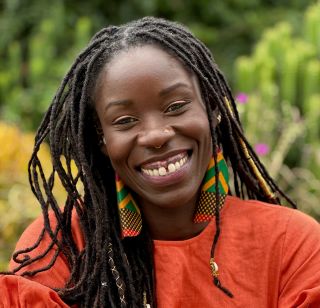A Guiding Light At The End of Life
Death doula Alua Arthur supports people through their fears about death.
By Abigail Fagan published May 7, 2024 - last reviewed on July 2, 2024

Alua Arthur is a death doula—she provides existential, emotional, and practical support to people who are dying. She came to this work through a dark chapter in her own life; she struggled with depression, reflected on her own mortality, and experienced the passing of her beloved brother-in-law. By exploring death, and learning to help others through it, Arthur built a new life, rooted in authenticity, honesty, and purpose. She shares her story in the new memoir, Briefly Perfectly Human.
How do you support people through their fears of death?
I practiced law for almost a decade, and I grew terribly depressed. I took a medical leave of absence and went to Cuba. On the bus, I met a young woman who had uterine cancer, and we had the richest, realest conversation. What became clear was that there wasn’t any space for her to talk about dying and her fears around it. Her psychiatrist only wanted to talk about living with disease. Her family and friends would steer her back toward hope, healing, and living. It was limiting, and it was unfair that she couldn't talk about death because of other people’s discomfort.
People’s fears around death fall into four major categories: 1) pain—fear of the processes of the body; 2) the unknown—what, if anything, happens after death; 3) loss of control; and 4) a life not fully lived. It’s not my job to help people get over their fears of death; that’s a deeply existential journey that every individual must take on their own. My job is to sit alongside them as they work through it.
But there are still some things I can offer. When their fear is about the process of the body, we talk about pain management, hospice care, and needs at the end of life. When they question the unknown, I help them get clearer on their belief system. For the fear of not having lived fully, I support them in understanding the thing that’s missing. There was a client who hadn’t left the bed in months, but she still wanted to dance and perform. She couldn’t do it, so we looked at ways to be it. We looked back at the life she created. When she moved or talked, everything about her was poetic and lyrical. It took a while, but she realized that she already embodied what she sought in dance.
